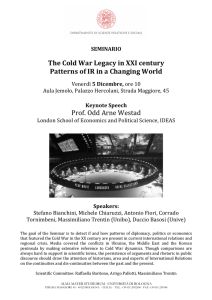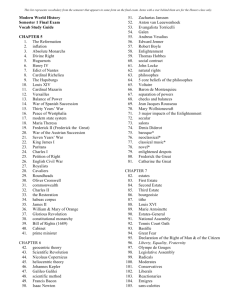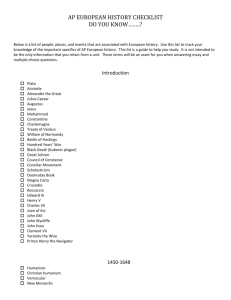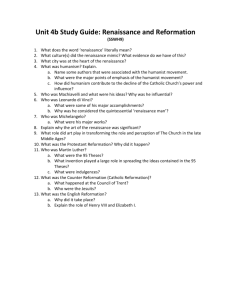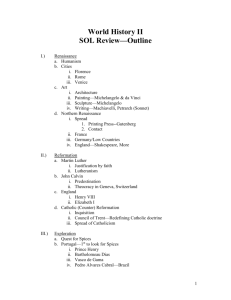Summer Assignment
advertisement
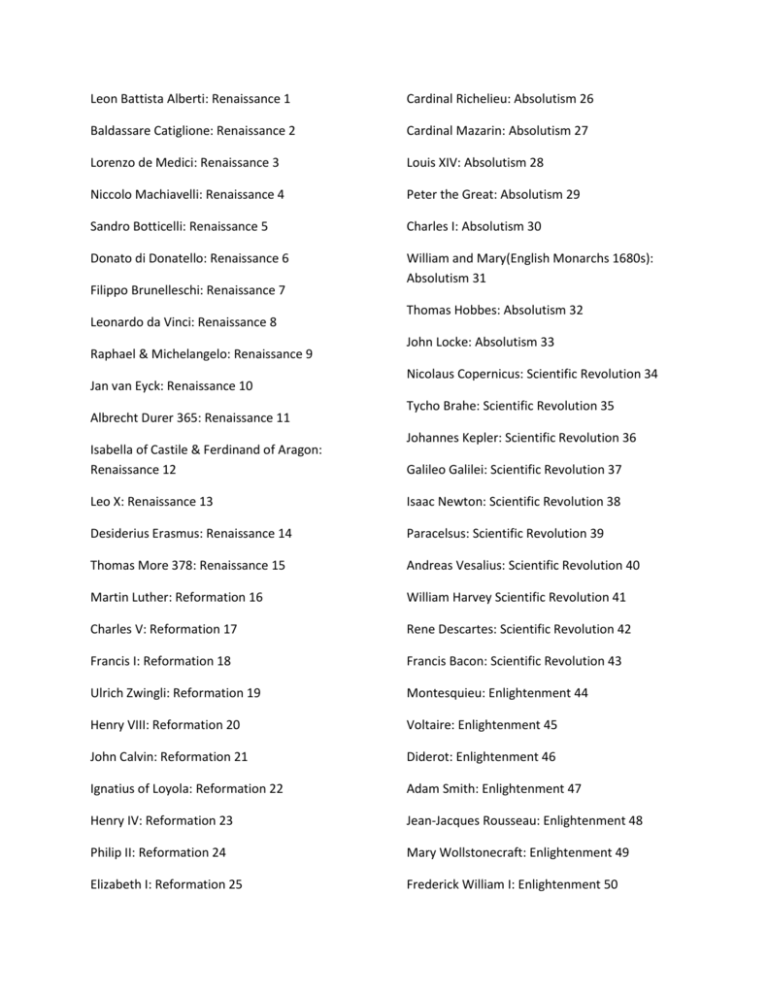
Leon Battista Alberti: Renaissance 1 Cardinal Richelieu: Absolutism 26 Baldassare Catiglione: Renaissance 2 Cardinal Mazarin: Absolutism 27 Lorenzo de Medici: Renaissance 3 Louis XIV: Absolutism 28 Niccolo Machiavelli: Renaissance 4 Peter the Great: Absolutism 29 Sandro Botticelli: Renaissance 5 Charles I: Absolutism 30 Donato di Donatello: Renaissance 6 William and Mary(English Monarchs 1680s): Absolutism 31 Filippo Brunelleschi: Renaissance 7 Leonardo da Vinci: Renaissance 8 Raphael & Michelangelo: Renaissance 9 Jan van Eyck: Renaissance 10 Albrecht Durer 365: Renaissance 11 Isabella of Castile & Ferdinand of Aragon: Renaissance 12 Thomas Hobbes: Absolutism 32 John Locke: Absolutism 33 Nicolaus Copernicus: Scientific Revolution 34 Tycho Brahe: Scientific Revolution 35 Johannes Kepler: Scientific Revolution 36 Galileo Galilei: Scientific Revolution 37 Leo X: Renaissance 13 Isaac Newton: Scientific Revolution 38 Desiderius Erasmus: Renaissance 14 Paracelsus: Scientific Revolution 39 Thomas More 378: Renaissance 15 Andreas Vesalius: Scientific Revolution 40 Martin Luther: Reformation 16 William Harvey Scientific Revolution 41 Charles V: Reformation 17 Rene Descartes: Scientific Revolution 42 Francis I: Reformation 18 Francis Bacon: Scientific Revolution 43 Ulrich Zwingli: Reformation 19 Montesquieu: Enlightenment 44 Henry VIII: Reformation 20 Voltaire: Enlightenment 45 John Calvin: Reformation 21 Diderot: Enlightenment 46 Ignatius of Loyola: Reformation 22 Adam Smith: Enlightenment 47 Henry IV: Reformation 23 Jean-Jacques Rousseau: Enlightenment 48 Philip II: Reformation 24 Mary Wollstonecraft: Enlightenment 49 Elizabeth I: Reformation 25 Frederick William I: Enlightenment 50 Frederick the Great: Enlightenment 51 Queen Victoria: 1800s 76 Maria Theresa(Austria Leader 1700s): Enlightenment 52 Benjamin Disraeli: 1800s 77 Joseph II: Enlightenment 53 Catherine the Great: Enlightenment 54 Louis XVI: French Revolution 55 Olympe de Gouges: French Revolution 56 Maximilien Robespierre: French Revolution 57 Napoleon Bonaparte: French Revolution 58 Klemens von Metternich: Conservatism 59 Louis XVIII: Conservatism 60 Thomas Malthus: Conservatism 61 David Ricardo: Conservatism 62 Charles Fourier: Conservatism 63 Robert Owen: Conservatism 64 Louis Blanc: Conservatism 65 Louis-Philippe: Conservatism 66 Napoleon III: Conservatism 67 Baron Haussmann: Conservatism 68 Count Cavour: Unification 69 Victor Emmanuel: Unification 70 Guiseppe Garibaldi: Unification 71 King William I(Prussia): Unification 72 Otto von Bismarck: Unification 73 Francis Joseph: Unification 74 Alexander II: 1800s 75 William Gladstone: 1800s 78 Karl Marx: 1800s 79 Charles Darwin: 1800s 80 Louis Pasteur: 1800s 81 Eduard Berstein: 1800s 82 William II: 1800s 83 Albert Einstein: 1800s 84 Friedrich Nietzsche: 1800s 85 Sigmund Freud: 1800s 86 Emmeline Pankhurst: 1800s 87 Theodor Herzl: 1800s 88 David Lloyd George: 1800s 89 Alfred Dreyfus: 1800s 90 Sergei Witte: 1800s 91 Nicholas II: World War I 92 Francis Ferdinand: World War I 93 V. I. Lenin: World War I 94 Benito Mussolini: World War II 95 Adolf Hitler: World War II 96 Leon Trotsky: World War II 97 Joseph Stalin: World War II 98 Francisco Franco: World War II 99 Henri Petain: World War II 100 Winston Churchill: World War II 101 Harry Truman: Cold War 102 Nikita Khrushchev: Cold War 103 Josip Broz Tito: Cold War 104 Charles de Gaulle: Cold War 105 Clement Attlee: Cold War 106 Leonid Brezhnev: Cold War 107 Lech Walesa: Cold War 108 Alexander Dubcek: Cold War 109 Margaret Thatcher: Cold War 110 Francois Mitterrand: Cold War 111 Mikhail Gorbachev: Cold War 112 Boris Yeltsin: Cold War 113 Vladimir Putin: Cold War 114 Your assignment for the summer is to create a notecard for each of the people on this list. On the bottom of each notecard, please include the name of the unit and the number. For each person, make sure to include the country that they are from, their position, and a few details about what made them important. On the first day of school we will have a quiz on the important people from the Renaissance. You will receive a grade for your notecards. For AP European History, you will need to keep a notebook in the classroom. In this notebook, we will add notes, study guides, and graphic organizers for each chapter throughout the year. Your notebook will only leave the room before a test and must be returned on test days. After the holiday break, you will also be required to buy a Barron’s review book for AP European History. I would suggest that you have that book for the start of the year, but you will be required to have it in class until after the holiday break. Tony Blair: Cold War 115 Group Code for AP Euro 2014-2015 Edmodo Page: jn9scb
